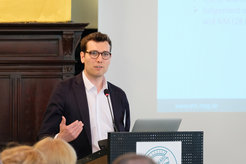Making Migration Law More Consistent and Comprehensible
MPI Head of Research Group Luc Leboeuf, together with Dirk Vanheule, Professor in the Faculty of Law at the University of Antwerp, are chairing an advisory expert commission on migration law in Belgium. The commission was convened by the Belgian Secretary of State for Asylum and Migration in view of establishing a new Migration Code. We talked with Leboeuf about his work on the commission.

Luc, how did you become co-chair of this commission for revising migration law?
Officials from the Belgian Government asked if I would be willing to chair the work of this commission, together with Dirk Vanheule. This is a unique opportunity to contribute to improving migration law and thus help to increase legal certainty in Belgium. I was pleased to accept.
Why does Belgian migration law need to be revised?
The law was created in 1980 and has been altered more than 100 times since then. These changes were mostly incidental and not always compatible with each other. As a result, the text of the law has become more and more confusing and inconsistent, and procedures to obtain a residence permit have become excessively complex and intricate. The law simply isn’t in an acceptable state anymore.
What are the consequences of this poor state of affairs?
Those who have to navigate these laws every day – judges, lawyers, government officials, humanitarian organizations, social workers, and migrants themselves – need to be able to rely on easily readable and comprehensible, transparent, and coherent rules. They have been asking for a comprehensive and consistent Migration Code for more than a decade.
How will the commission’s work help to eliminate the shortcomings and inconsistencies in the law?
The members of the independent expert commission – Dirk Vanheule and myself, along with six other independent experts – created guidelines to aid the officials drafting the provisions in the Migration Code; we are now overseeing the drafting process with the support of the Secretary of State’s office. The objective of the guidelines is to improve the quality of the law and its overall coherence, including streamlining existing procedures in a way that guarantees migrants’ rights.
How does the commission develop these guidelines?
We consulted with around 90 stakeholders, including civil society organisations and public administrations who work with the law in practice on a daily basis, and asked them about their needs and experiences. The commission also benefits from the support of a working group including 6 public servants from the main government bodies in charge of implementing migration laws. They provide regular input on the implementation challenges and the solutions identified by the commission. It was important for us to avoid thinking in our own academic bubble, with no connection to the law in its lived dimensions.
Has this process proved effective?
Yes, definitely. The discussions with other experts have helped us to understand where the problems lie and what aspects require particular care when working on the revision.
When will the work of the commission be finished, and when is the new law due to go into effect?
It’s difficult to say when the Migration Code will go into effect, because it isn’t possible to predict exactly how the legislative process will progress. But the government expects us to hand over our work by the end of 2022.
